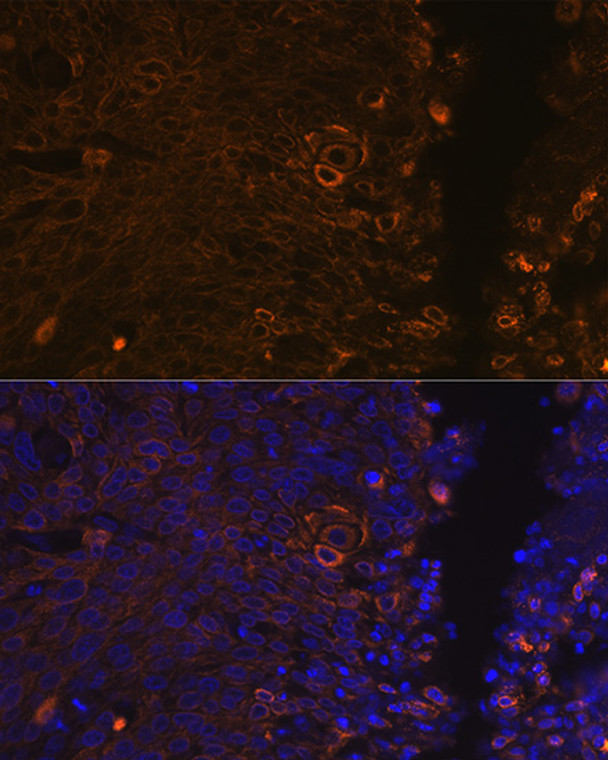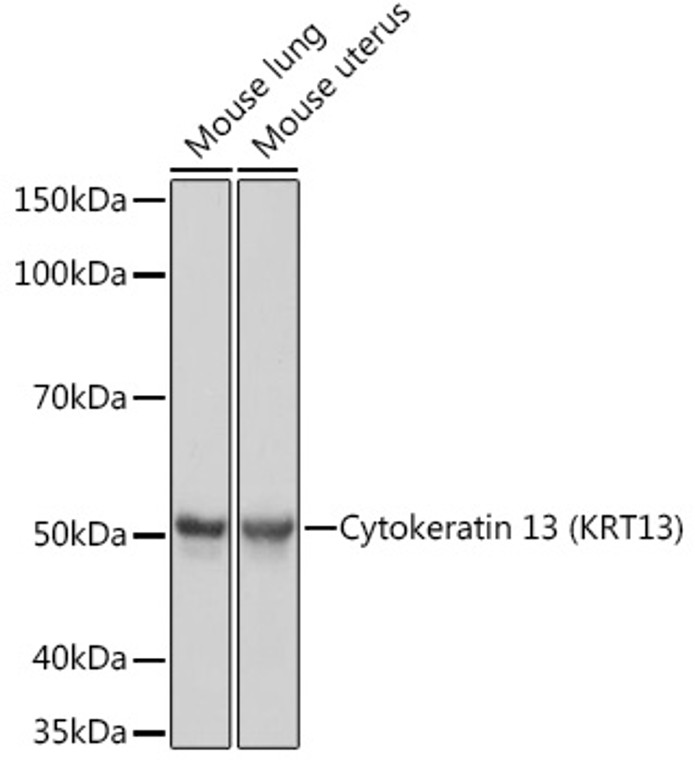| Host: |
Rabbit |
| Applications: |
WB/IHC/IF |
| Reactivity: |
Human/Mouse/Rat |
| Note: |
STRICTLY FOR FURTHER SCIENTIFIC RESEARCH USE ONLY (RUO). MUST NOT TO BE USED IN DIAGNOSTIC OR THERAPEUTIC APPLICATIONS. |
| Short Description: |
Rabbit monoclonal antibody anti-Cytokeratin 13 (100-200) is suitable for use in Western Blot, Immunohistochemistry and Immunofluorescence research applications. |
| Clonality: |
Monoclonal |
| Clone ID: |
S6MR |
| Conjugation: |
Unconjugated |
| Isotype: |
IgG |
| Formulation: |
PBS with 0.02% Sodium Azide, 0.05% BSA, 50% Glycerol, pH7.3. |
| Purification: |
Affinity purification |
| Dilution Range: |
WB 1:500-1:2000IHC-P 1:50-1:200IF/ICC 1:50-1:200 |
| Storage Instruction: |
Store at-20°C for up to 1 year from the date of receipt, and avoid repeat freeze-thaw cycles. |
| Gene Symbol: |
KRT13 |
| Gene ID: |
3860 |
| Uniprot ID: |
K1C13_HUMAN |
| Immunogen Region: |
100-200 |
| Immunogen: |
A synthetic peptide corresponding to a sequence within amino acids 100-200 of human Cytokeratin 13 (KRT13) (P13646). |
| Immunogen Sequence: |
LTGNEKITMQNLNDRLASYL EKVRALEEANADLEVKIRDW HLKQSPASPERDYSPYYKTI EELRDKILTATIENNRVILE IDNARLAADDFRLKYENELA L |
| Tissue Specificity | Expressed in some epidermal sweat gland ducts (at protein level) and in exocervix, esophagus and placenta. |
| Post Translational Modifications | O-glycosylated.glycans consist of single N-acetylglucosamine residues. |
| Function | Type 1 keratin (Probable). Maintains postnatal tongue mucosal cell homeostasis and tissue organization in response to mechanical stress, potentially via regulation of the G1/S phase cyclins CCNE1 and CCNE2. |
| Protein Name | Keratin - Type I Cytoskeletal 13Cytokeratin-13Ck-13Keratin-13K13 |
| Database Links | Reactome: R-HSA-6805567Reactome: R-HSA-6809371 |
| Alternative Antibody Names | Anti-Keratin - Type I Cytoskeletal 13 antibodyAnti-Cytokeratin-13 antibodyAnti-Ck-13 antibodyAnti-Keratin-13 antibodyAnti-K13 antibodyAnti-KRT13 antibody |
Information sourced from Uniprot.org
12 months for antibodies. 6 months for ELISA Kits. Please see website T&Cs for further guidance











